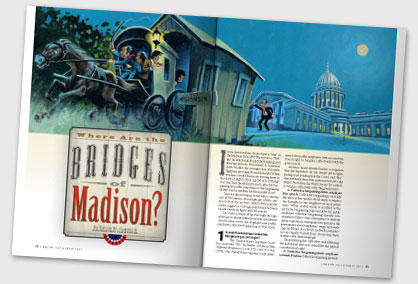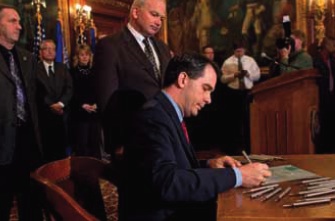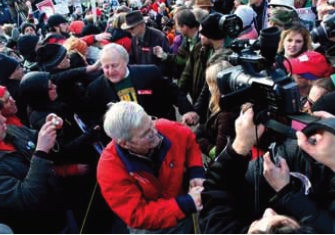Where are the Bridges of Madison?
Bruce N. Cameron July/August 2011
If you love freedom, do you have a "dog" in the Madison fisticuffs? The answer is "Yes!" But on which side should the thinking civil libertarian be in Wisconsin? Is Governor Scott Walker the younger face of former Egyptian president Hosni Mubarak? When you hear about Democrats leaving town in the dark of night is that a good or bad thing? Is it true that the elimination of collective bargaining for public employees is the beginning of the road to serfdom for the middle class?
Uncritically listening to the news coming out of Wisconsin, you might get a little confused about the answers. Much of the popular media suggests a striking resemblance between recent events in Egypt and Wisconsin.
Let's take a couple of laps through the logic of the law to decide where those who love liberty should come out in the dogfight over public employee collective bargaining in Wisconsin.
1 Is public employee collective bargaining a civil right?
The United States Supreme Court has an answer: "No." In Smith v. Arkansas State Highway Employees, Local 1315—441 U.S. 463 (1979)—the United States Supreme Court determined that public employees have no constitutional right to bargain collectively with the government.
Because many citizens harbor a suspicion that the Supremes do not always get it right, perhaps just reading that the Court said "No," does not settle the matter in your mind. Let's dig deeper by examining what it means for a union to bargain collectively with the government.
a. Collective bargaining limits employee free speech: Collective bargaining is not like the kind of free speech we all enjoy to express our thoughts to our neighbors or local politicians. When a labor union is certified as the exclusive bargaining representative for public employee collective bargaining, specific consequences follow. One consequence is that the union is granted a monopoly over speech to the government about employees' wages and working conditions. As a result, individual employees are legally barred from discussing these matters with their employer.
Empowering the collective and silencing the individual does not sound like the typical constitutional right.
b. Collective bargaining limits employee economic freedom: Collective bargaining prevents employees from selling their labor on their own terms. This limit on individual economic freedom violates antitrust laws because it restrains competition. Recognizing this, Congress created an exemption in the Sherman Act, 15 U.S.C. 1, et seq., allowing unions a monopoly in collective bargaining.
You might say, "Don't tell me about theory. Let's be practical. Making a living wage should be a civil right. Employees have no power unless they are granted a monopoly. It is right to muzzle some employees for the benefit of the collective!" Exactly how many government employees do you know who do not make a "living wage"?
Did you know that almost all employees in the private sector (93 percent) are not represented by a labor union? These employees have decided that they do not need a union monopoly to bargain collectively for them.
One very important practical aspect of collective bargaining in the public sector is highlighted by public education. Most union contracts require a single wage rate (or salary) for all employees in the same job classification. No exceptions are made for ability, industry, or skill. Because a single wage rate must be an average rate, superior employees (those with above-average ability, industry, or skill) find that they are underpaid, and inferior employees find that they are overpaid.
Everyone who has attended school knows that some teachers are great, and some are not so great. Monopoly collective bargaining ensures that they are all paid the same—thus encouraging superior teachers to leave the profession and inferior teachers to stay.
Public employee collective bargaining harms both individual employee speech and individual economic freedom. The larger reason it is not a constitutional right is its impact on democracy, which we turn to next.
2Is public employee collective bargaining the friend or enemy of democracy?
Whatever tales your grandfather might have told you about the "bad old days" when he labored from sunrise to sunset for Scrooge Stamping for 10 cents an hour after walking barefoot in the snow at on -140° F when he was 8 years old, don't miss one important fact: Public employees work for your grandfather, your father, your mother, your children, and you! If your grandfather learned any lessons about the fair treatment of employees while toiling for Scrooge, he has ample opportunity to show what he learned in treating fairly the public servants who work for him!
a. Regular citizens are locked out by collective bargaining: The problem is that public employee collective bargaining prevents your family from applying Grandpa's lessons. The average citizen has little to no opportunity to have a voice in the working conditions of public employees because those decisions almost always take place outside the sunshine of public view.
When the U.S. Supreme Court discussed collective bargaining and the First Amendment in Smith, it accepted that every citizen has a right to speak to and petition the government. Conversely, the government has no obligation to respond or even listen. The normal recourse for citizens is to throw the bums out at the next election if they don't like being ignored.
Public employee collective bargaining laws require something much different. Collective bargaining requires the government to engage in "good faith" negotiations with the union. Failure of the government to attempt to reach an agreement with the union is illegal. When an agreement is reached, it must be reduced to writing.
This is another reason collective bargaining cannot be a civil right. One citizen has no right to a monopoly barring another citizen from speaking to government. Instead, every citizen has an equal right to speak. No citizen or group of citizens has the right to force the government into a dialogue policed by a third party. No one has the right to compel the government to enter into a written agreement on his pet issues. Instead, if our local politicians disagree with our viewpoint, our remedy is our right at election time to vote for someone else.
 Wisconsin Governor Scott Walker signs the ceremonial bill, after the Republican-controlled House and Senate eliminated almost all collective bargaining for most public workers at the state Capitol in Madison, Wisconsin.
Wisconsin Governor Scott Walker signs the ceremonial bill, after the Republican-controlled House and Senate eliminated almost all collective bargaining for most public workers at the state Capitol in Madison, Wisconsin.
b. The dislocation of taxpayer rights by collective bargaining is serious: Consider that labor-related costs are generally the largest category of expense for local government. The percentage commonly cited for employment-related costs in schools and local government is 60 percent of the total budget. Labor costs, of course, are at the heart of collective bargaining for public employees. Collective bargaining in Wisconsin takes place behind closed doors. Taxpayers are excluded from the bargaining process. As a result, they have no direct voice in deciding how a majority of their local tax dollars are spent. The two parties at the bargaining table are union representatives and, typically, nonelected government administrators who are required to bargain in good faith with the union, and only the union, over at least 60 percent of the local government budget.
Not only is this inconsistent with democracy—you can understand why Governor Walker argued that limiting the scope of collective bargaining for public employees is critical to containing the spiraling cost of government. Nothing helps to control the cost of government better than letting taxpayers have a clear view of and a firm say in how their money is spent.
If you move high enough up in the typical governmental bureaucracy, you will find an elected official whom taxpayers can hold accountable for budgetary decisions. But even then taxpayers' hands are tied. Typically collective bargaining agreements are entered into for a term of three years. Even if voters tossed out their elected representatives at the next election, that would not alter existing collective bargaining agreements, which put approximately 60 percent of the taxpayers' obligations out of their immediate reach.
Even when politicians decide to take a firm stand against increased employee-related costs, other aspects of public employee collective bargaining thwart their efforts. Because public employees generally are barred from striking, many states provide public employee unions with the right to invoke "interest arbitration" when the government refuses to agree to union demands and negotiations break down. Interest arbitration turns over to an unelected labor arbitrator the final decision on disputed wage raises and other economic decisions! Neither elected politicians nor the taxpayer has the authority to override the arbitrator's decision.
Another problem is that public employee unions are to some degree always sitting on both sides of the collective bargaining table. Here is how: In the private sector, the employer knows that if it does not limit labor costs, it will go out of business. This is a powerful incentive to hold the line on wages. The opposite is true for government. Not only is government not going to go out of business because of competition, but the government bureaucrats sitting at the bargaining table know that if employee salaries go up, likely their administrator salaries will also go up. Consequently, no one at the bargaining table has an economic incentive in line with the interests of those who want to hold down taxes and government spending.
The National Education Association, the largest labor union in the United States, has long promoted the election of its members to local school boards. When NEA members are elected to a school board, the union truly sits on both "sides" of the table.
Even if local politicians are not members of the union representing their public employees, unions are heavily involved in funding local political campaigns. To get an idea of the level of the NEA's political involvement, consider this: the NEA recently reported that slightly less than half its dues are expended for collective bargaining costs. The rest is spent for political and ideological activities!
In Wisconsin the NEA's state affiliate, the Wisconsin Education Association, contributed more money for politics than any other labor union in the state's last election cycle. Other labor unions were close behind. Excluding political parties and individual contributors, organized labor accounted for five of the top seven political contributors in Wisconsin. This gives politicians a powerful incentive not to hold the line on public employee collective bargaining.
The darker side of the anti-democratic aspect of Wisconsin public employee collective bargaining is that up to now public employees have been required to join the union or pay compulsory union fees as a condition of employment. Thus, the huge political power that public employee unions exert is derived in part from employees who do not agree with union politics.
c. Imagine if collective bargaining rights were given to other organizations: Proponents of public employee collective bargaining argue that employees have a unique interest in their working conditions, and therefore they should be allowed to engage in anti-democratic, closed-door collective bargaining. The National Rifle Association and its members have a unique interest in gun laws, the International Brotherhood of Teamsters has a unique interest in trucking regulations, and the American Medical Association has a unique interest in medical malpractice laws.
How democratic would it be to allow the Teamsters to negotiate secretly truck safety regulations, and write the laws governing maximum truck speed and weight? What about allowing the NRA to negotiate behind closed doors what kinds of guns can be privately owned and what gun registration, if any, is necessary? Should the AMA be able to force government to covertly negotiate malpractice laws only with it?
This type of backroom deal is inconsistent with a one-person, one-vote democracy. The NRA, Teamsters, and AMA are special interest factions that (naturally) put their members' interests ahead of the public interest. Collective bargaining gives public employee factions a special portal into government decision-making that is not available to regular citizens.
 The 14 Wisconsin Democratic senators that left the state to protest the bill proposed by Governor Scott Walker return to massive crowds that continue to protest at the Wisconsin State Capitol
The 14 Wisconsin Democratic senators that left the state to protest the bill proposed by Governor Scott Walker return to massive crowds that continue to protest at the Wisconsin State Capitol
March 12, 2011.
3 Are the protests in Wisconsin like the protests in Egypt?
So far, we have seen that public employee collective bargaining is not a constitutional right or even a civil right, because it is inconsistent with democracy. Are the protests in Wisconsin democracy in action?
a. Skip the polling booth and go straight to jail: The last presidential election in Egypt brought reports that some citizens who tried to vote were fired upon, and 10 were killed. The runner-up in the election, Ayman Nour, was jailed. No similar reports have surfaced from the most recent elections in Wisconsin. No one in the Wisconsin legislature claimed to have won through superior weaponry. Losers were not jailed. Instead, the will of the electorate was freely expressed, and Governor Walker and a Republican majority won their posts by persuasion, not coercion. The government in Wisconsin bears no resemblance to the past government in Egypt.
b. Mug a taxpayer and go to Madison: The bulk of the demonstrators in Madison, however, raise serious challenges to democracy. Citizens are entitled to visit the legislature and voice an opinion. Would the picture change if they just robbed the local convenience store to get the funds to make the trip? Media reports showed that many of the demonstrators were public employees who were marching on the capitol during regular work hours. Braving the cold weather, they picketed and screamed even though they reported to the government that they were too "sick" to go to work. Who was robbed so that the "sick" demonstrators could voice their opinions? The taxpayers!
Wisconsin taxpayers should not be shocked to discover that they are footing the bill for this political protest. Wisconsin law has long provided that public employee unions can require public employees to pay union dues—even those who refuse to join the union and want nothing to do with its politics. Government in Wisconsin not only compels compulsory union fees, but also provides free debt-collection services to the unions. State and local governments in Wisconsin collect the political portion of union dues and the unions' political action committee money and then hand this money over to the unions—all at taxpayer expense.
c. Running from democracy: While lovers of liberty hope that the goal in Egypt is to bring in an era in which citizens can freely cast their votes for representative officials who, in turn, may freely vote in the legislature, that was manifestly not the goal of the demonstrators or the Senate Democrats in Madison. The Senate Democrats left the state in the dark of night for the purpose of denying the senate the opportunity to vote. Screaming demonstrators in the legislative gallery substituted name-calling for free debate.
Governor Walker is restoring democracy to Wisconsin. By eliminating some (but not all) public employee collective bargaining, he is taking budgeting decisions out from behind closed doors and putting them in the hands of the taxpayers. By eliminating compulsory union fees and state-subsidized union fee collections, he is restoring freedom of choice to public employees and a level playing field for taxpayers.
Those whose first love is religious freedom might not think they have a dog in the fight in Madison, but they do. Religious freedom never stands alone. It accompanies freedom of speech, association, and press, and a free market. The same anti-democratic, collectivist policies and practices at the heart of the battle for Wisconsin are also the natural enemies of religious freedom.